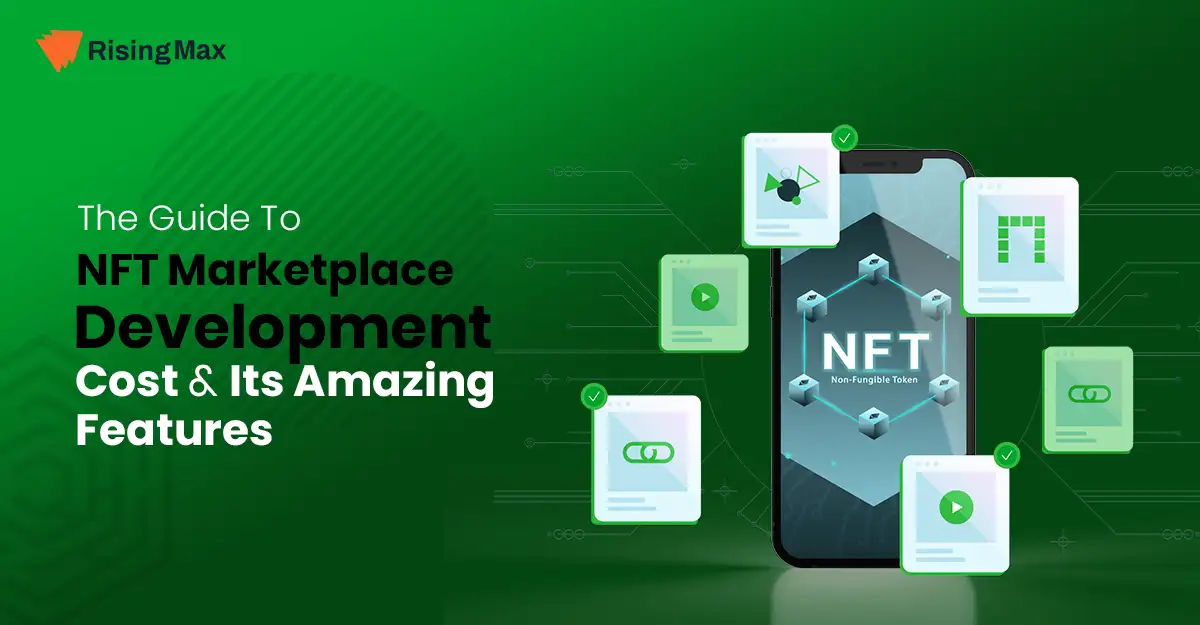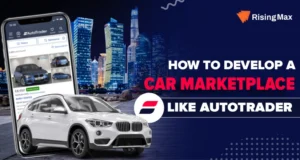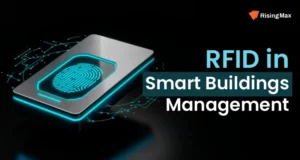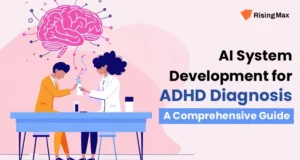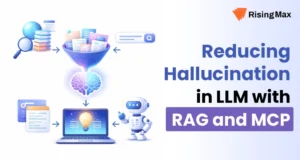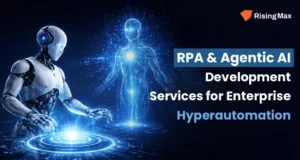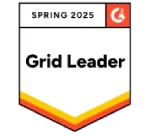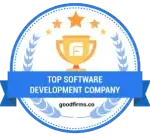Are you looking for the NFT marketplace development cost? You’ve reached the right place.
The average NFT marketplace development cost ranges between $45,000 to $50,000. Yes, that’s what it costs to build an NFT marketplace. We at RisingMax Inc. can launch your NFT marketplace within this budget estimation. Skip reading and connect with our experts today to build your own NFT marketplace platform.

NFTs, or non-fungible tokens, have been trending for a while now and are taking the crypto world by storm. Simply put, they are digital assets, much similar to standard assets, but each of them is differentiated by a specific unique code recorded on the Blockchain.
They’re also called digital certificates for owning goods or assets representing various things like paintings, music, videos, etc. Certificate templates can be used to design and issue digital certificates that represent ownership or authentication of various items or assets.
The high utilization of NFT technology benefits both the content creators and the marketplaces where they are hosted. For example, – OpenSea has become the hot spot of high revenue that indicates every business touched by NFT is turning into gold. But the question that strikes your mind is what makes the NFT marketplace the source of profits that is much higher than the direct creating and selling of NFT.
While knowing the NFT marketplace development cost is getting viral across the internet, we will dive deeper.
In this blog post, we’ll be going to determine the cost of developing an NFT marketplace and what entrepreneurs need to know when they enter the crypto space by launching the best NFT marketplace.
Also Read: NFT based game development companies in Singapore
What Is NFT Marketplace?
One of the important elements you need to know before you get on the road to building an NFT market is what exactly it is. Simply, the NFT marketplace is an online marketplace where content creators can start selling non-fungible virtual products. In contrast, buyers can buy them using cryptocurrencies like Bitcoin or Ether.
The purpose of the crypto marketplace is to charge the transaction amount every time an NFT is purchased via the platform. Once the NFT is purchased, the buyer will be provided with the token, a unique identifier containing proof of ownership about the particular author. The most famous examples of NFT marketplaces are:
- OpenSea
- Axie Marketplace
- Rarible
- Nifty Gateway
- NBA Top Shot
In Simple Way,
Any digital file such as digital artwork, music, GIF, clip, photo, tweet, games, or more can become a Non Fungible token. These digital assets are tracked by blockchain technology that supports major cryptocurrency players like Bitcoin and Ethereum. The process of NFT provides an actual owner to enjoy the exclusive ownership rights of the digital asset.
In other words, NFT files are digitally secured documents. People can copy the content, but the original files lie on the same platform. It can also be compared with museum files that you can see only or buy copies of. The original item stayed in the same place!
Align the current state of IT with your business strategy by hiring the most trustworthy NFT Marketplace Development Development Company
Why Invest in NFT Marketplace Development?
Before answering this question, let’s have a look at the current NFT market size and statistics;
- The NFT market is expected to generate a revenue of US$1,625.00 million in 2024.
- An annual growth rate (CAGR) of 18.55% is anticipated from 2023 to 2027.
- NFT marketplace and revenue from NFT sales are projected to reach $3,162 million US dollars by 2027.
- The average revenue per user for the NFT market is projected to be US$114.80 in 2023.
All these facts are from Statista.
Popular NFT Marketplaces and Their User Base
| NFT Marketplace | User Base |
| Opensea | More than 1 million registered users |
| Axie Marketplace | More than 1.8 million daily users |
| Rarible | Close to 2.1 million registered users |
| Nifty Gateway | Close to 1 million users |
| NBA Top Shot | More than 1 million registered users |
A quick overview of the above-mentioned key market stats and the market forecast is sufficient to understand why investing in NFT marketplace development is a worthy business move.
Are you planning to grab this futuristic business opportunity in the NFT marketplace? Then, now is the time to connect with our experts at RisingMax Inc. and set foot right.Working And Features Of NFT Marketplace
Almost every NFT token has unique information recorded inside the Blockchain to provide security. Usually, NFT marketplaces run on a common workflow where users sign up on the platform and install a digital wallet to store NFTs.
They then create a proper collection by displaying the work and choosing the payment token they accept for the digital items.
In the next step, the bid is selected for the auction or kept at a fixed price. Once the platform’s collection moderate request is approved, the NFTs further start to appear on the list of sales, where you can go with the acceptance of bids.
Now that you are much clearer about the concept of the NFT marketplace and its working, you need to come on the engineering side of one of the platforms. The overall cost to develop the NFT marketplace depends on the NFT features you want to add.
- Storefront- This part of the marketplace provides users with details, owners, bids, price history, and much more.
- Smart search functionality- Such functionality makes it quite easy for users to look for collectibles that they are willing to buy.
- Create A List- Create a listing feature of the marketplace mainly centered around the sellers, enabling users to build listings and add their NFT details.
- Auction & Buy- An efficient NFT buying system allows users to add bid amount, expiration date, etc.
- Wallet- Your users are likely to use wallets to send, receive, and store NFTs plus cryptocurrencies. You can start by creating your own in-app wallet or integrating an existing one inside the app to deliver more personalized experiences.
So these are some of the most recommended features of an NFT marketplace. Many other features offer the ability to create NFTs, multi-payment gateway integration, and much more. Entrepreneurs like you can develop and launch NFT platforms and their essential features all in one place.
Amazing Features Of An NFT Marketplace Development
As you are looking to build an NFT marketplace, you need to work on both front and back-end concerns. NFT developers must create a user experience that should be simple to handle and can seamlessly handle complex transactions. Let’s have a look at some of the highly recommended features of your NFT Marketplace.
1. Storefront
NFT Marketplace is similar to e-commerce websites that require an attractive and intuitive front end. The administrator just needs to decide how much information they want to showcase on their website home or landing page. These can be images, content creator names, number of buyers, etc.
Just as physical art collectors, NFT marketers also want to know the authenticity of their files. Therefore, if the content creator wants to list various copies of their original files, they have to name them with “Number 2, 3, or so on out of total copies. It ensures the collectors that they are getting which copy or original one-of-a-kind content.
2. Search Items
When you are planning to create an NFT marketplace, you need to decide about search filter options like OpenSea, and Rarible websites. Search options ensure easy-to-handle transactions and assist the newer Marketplace in selecting a niche. Whatever you have listed on your website, easy-to-reach features boost the digital assets buying process.
3. Filters
Web filters can enhance the user’s experience. Buyers can drill down to their needs with ease. It benefits in eliminating the need for numerous search queries just to find something specific. In the NFT marketplace, buyers can sort products based on categories, cost, rarity, and artist name. Filters also help to increase a website’s conversion by 26%.
4. Listings
A well-established NFT marketplace provides simple and clear instructions to both buyers and sellers. This makes the uploading task easier in a few simple steps. So, when building an NFT marketplace, make sure it must be user-friendly and sell digital assets.
5. Status Of Listing
Both parties, buyer, and seller in an NFT marketplace, need adequate information from their end. The seller wants to know how many people view the auction and the number of people participating in the bid. Even if someone is making any suggestion, the seller wants to know that with the location. On the other hand, the buyer wants to ensure the file has gone through the authentication process before making payment. Lastly, collectors appreciate verified items.
6. Buying And Auction
NFT developers offer various selling mechanisms, including direct buying or purchasing through auctions. Direct buying is just like purchasing from e-commerce sites where the buyer chooses a product at a specific rate. Don’t forget there will still be a change in payment methods as the NFT marketplace is empowered by cryptocurrency.
On the other hand, famous artists prefer auctions to raise competition and the value of digital assets. But the back-end process of the auction gets harder compared to regular sales. Websites have to provide real-time access to the information to the users to complete a bid.
7. Wallet
Wallets are one of the safest ways to complete transactions. Therefore, the NFT marketplace introduced this method in the first place. So, make sure your Marketplace has suitable features that create a hedge between specific threats and online frauds.
Most NFT marketplaces integrate options like Formatic or Coinbase to put the user’s convenience first. You can also add a top-rated crypto wallet to your platform. It saves time, and users can do everything like storing, submitting, and obtaining tokens with no fear.
Also Read: Custodial Vs Non-Custodial Wallet
8. Ratings
Newbies have no idea how to start and which platform is the best for specific needs. Thanks to the rating and review option. It helps new users to find the right platform for their requirements. Feedback also provides suggestions on whether a particular NFT marketplace is reliable or not.
NFT Blockchain Options
- Binance Smart Chain
- Flow (by Dapper Labs)
- EOS
- Solana
- Algorand
- Polkadot
- Tezos
- Cosmos
- Tron
- WAX
- Hedera Hashgraph
Non-Fungible Token Use Cases Across Multiple Industries
Now Non-Fungible token Use Cases across broad industries have been gaining significant popularity. Enterprises can now take a step to utilize the NFT tokens for the secure storage of personal data on Blockchain and much more than that.
NFTs For Gaming
NFTs will allow gaming players to trade in-game collectibles with ease and with proper validation.
NFTs For Music Producers
NFTs for Music Producers are for artists looking for ways to create for their audiences, and NFTs provide a new way to connect.
NFTs For Identity Theft
NFTs can be used to prevent identity theft. Digital artists use them to convert their artworks and establish unique copyright for them.
NFT For Art
Converting art into an NFT makes it easy for sellers to prove its authenticity and ownership, thus ensuring buyers that they are investing in genuine art.
NFT For Real Estate
The real estate properties can be minted and converted into non-fungible tokens to prove ownership rights and easy transfer ownership.
NFT For Fashion
Designers can take advantage of NFT minting and mint their clothes designs to reduce counterfeiting fraud.
NFT for Photography
Photographers can convert their photos into NFTs and showcase their talent to the world without worrying about counterfeiting.
NFT For Software
With the NFT marketplace, software licenses can be converted into non-fungible tokens, and only users with authentic NFT licenses can access the software.
NFT for Domains
Domain names can be converted into NFTs, assuring users that they are buying authentic and genuine domain names.
NFT Marketplace App – Steps To Build!
There is always a need to divide the entire product into smaller stages when it comes to app development. Here we break down the steps to building the NFT marketplace.
Step 1: Define Your Niche
In order to build a booming NFT marketplace, it is necessary to make you aware of the current market where suppliers sell the products to satisfy the needs of a particular targeted audience.
Step 2: Define App Panels
The panels of the app are decided on the types of users going to use that app. There are basically three types of users in NFT marketplace platforms.
- Buyers looking for digital artwork or other content
- Creators that are into creating and designing the digital assets
- Admins who manage the complete platform and are responsible for the exchange of funds between the sellers and buyers
Step 3 – Documentation
It Covers –
- Framing the structure and requirements
- Making decisions on user flow
- Regulating and finalizing the features
- Check control on quality
Step 4: App Prototyping
This is where UI/UX comes into play. The appearance and feel of your app are now more important than ever. As a result, prototyping the user interfaces and screen mockups is critical before the app’s actual coding and development.
Developers should wait until the client is satisfied with the prototype designs before coding the app.
Step 5: Development Stage
Developers begin implementing the app’s functional requirements, which were previously defined. At this point, the quality or non-functional requirements are also met.
Step 6: Implement Token Generators
Token generators construct minor contracts as they approach the implementation stage. You could be perplexed as to what a minor contract is.
Step 7: Test And Execute
This step aids developers in locating and correcting issues.
How Much Does NFT Marketplace Development Cost In 2026?
Now that you have better understood NFT marketplaces, the time is to discuss the cost to develop an NFT marketplace. NFT marketplace development cost ranges between $45,000 to $50,000. Further, the cost of building an NFT marketplace depends on the following factors that include;
- Integrated NFT marketplace features.
- Features complexity.
- Level of customization.
- Technology stack required.
- Total development time.
- 3rd party API integrations.
- Security features.
- Wallet integration.
- Hosting on 10gbps dedicated server
In addition to these factors, some more are on the list that help determine how much it cost to create an NFT marketplace. Let’s have a look and understand the brief NFT marketplace development cost breakdown. With this, users will have a rough estimate of how much it costs to create an NFT.
| Factors | Average Cost |
| UX/UI Development | $700 – $2520 |
| User Profiles | $650 – $2520 |
| Authorization and Security | $1080 – $4320> |
| Home Page | $1260 – $5040 |
| Search and Filters | $1450 – 5760 |
| Product Page | $650 – $2520 |
| Shopping Cart | $750 – $2880 |
| Payments | $700 – $2520 |
| Ethereum Incorporation | $1440 – $5750 |
| NFT Management | $1440 – $5800 |
| Inventory Management | $650 – $2520 |
| Admin Panel | $1350 – $5100 |
| Author Panel | $2000 – $7950 |
Why Do You Need An NFT Marketplace?
Well, the real question is, why not! As you already know, the NFT market revenue is projected to reach 8412 million US dollars by 2027. Thus, investing in NFT marketplace development creates an opportunity to generate million dollars in revenue.
Here’s how you can generate revenue from an NFT marketplace.
Commission Fee
Most popular NFT marketplaces like OpenSea generate revenue as a commission fee on the sale of every listed NFT. The commission fee is usually between 2 to 5 percent on every transaction.
Royalty Fee
Rather than charging a small commission fee on every transaction, today’s NFT marketplace has switched to a royalty model. This widens the revenue generation scope and entitles them to earn money as a royalty on NFT sales.
Listing Fee
NFT marketplace charges creators a fee before listing their NFT on the platform. This is one of the easiest ways of generating revenue, as you can upfront charge a fixed fee from the creators.
Advertisement Fee
As an NFT marketplace owner, you can charge an advertisement fee from creators to boost the visibility of NFT and quickly sell them. By just paying a nominal fee, creators of NFT can reach potential buyers and get the desired value.
Auction Fee
NFT sellers and buyers can participate in the auction of an NFT by paying an auction fee. While you can earn from every auction, NFT creators are assured that only potential buyers are part of the ongoing auction.
Moreover, there are multiple other benefits of investing in NFT marketplace development.
- Artists won’t rely on auctions or galleries to show and sell artwork.
- Artists can choose this platform to sell their unique art in the form of NFT.
- It also helps them to enjoy copyrights and get a commission on every copy sold.
FAQs
How Much Does It Cost To Create An NFT Marketplace?
The average NFT marketplace development cost ranges between $45,000 to $50,000. Further, the NFT marketplace development cost varies based on tools and technologies, project complexity, NFT marketplace niche, functionality, security features, and others. Get in touch with our expert today and get a customized cost of NFT marketplace development.
Can We Tokenize Anything On The NFT Marketplace Platform?
Yes, you can. Any digital file, such as digital artwork, music, GIF, clip, photo, tweet, games, or more can be converted into non-fungible tokens and sold on the NFT marketplace.
Which Are The Most Popular NFT Marketplace Platforms?
Here are the top five well-known NFT platforms leading the race:
- OpenSea
- Axie Marketplace
- Rarible
- Nifty Gateway
- NBA Top Shot

